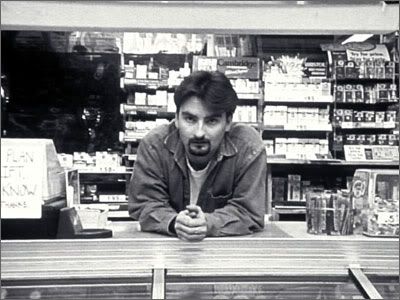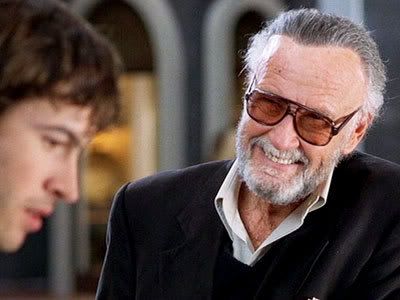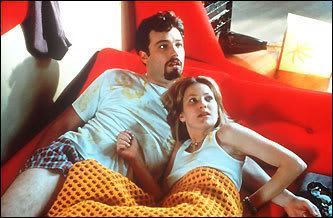Clerks.
"It's important to have a job that makes a difference, boys. That's why I manually masturbate caged animals for artificial insemination."
It won't be too much of a stretch for you to imagine my claim of what Smith's feature debut has going for it as a theme: work. How could it not - its main structural selling point is that it clocks a full day on the job. (Since Dante is stuck at the Quick Stop from open to close, we can easily guess that his shift lasts for about 17-19 hours. Has that stupid bastard who owns the joint and ran off to Vermont ever heard of a little thing called legally-mandated overtime?) Work, job titles, and the simple idea of "what you do" pervades almost every frame of Clerks, sometimes in very obvious ways and sometimes in very subtle ways. If it's not the topic of discussion, the mere fact that Dante and Randal are currently on-the-job colors and shapes the conclusions that every scene reaches. Because of that, despite the film's infamously raunchy verbosity and its grungy sense of humor, it's probably one of Smith's most thematically-soaked film.
One of the more obvious airings of the thematic laundry is seen in the famed Star Wars discussion. Much in modern film geekery can actually be traced back to this scene, perhaps more than it's even given credit for: Empire's better 'cause it's dark, Jedi blows, have you ever considered so-and-so, etc. After all, Clerks was one of the first films to represent the Gen-X mindset, and especially their experiences and perceptions of the pop culture they grew up with. In fact, Smith deserves more credit for this than Tarantino. Tarantino favors cult items, and therefore probably did more to open up people's interest towards things they didn't know existed; comparably, Smith favored mainstream references (Jaws, Star Wars, etc.) and therefore guided people towards rediscovery and re-assessment of things they were already fans of well back when they were younger. However, that said, the Star Wars conversation is also completely about jobs. It's about personal responsibility towards your profession - Randal supposes that the outside contractors on the second Death Star were unfortunate collateral, and an eavesdropping contractor refutes this by insisting that a personal code of ethics must be adhered to when choosing jobs. Dante and Randal are left pensive and uncertain, since they themselves are uncertain of their own personal ethics towards their meaningless register-jockey lifestyles. How appropriate, in fact, that Randal is the one who presupposes that the hypothetical outside contractors on the Jedi Death Star are blameless victims, since Randal himself is so drained of personal responsibility towards his job that he constantly and consistently acts out. One imagines that Randal himself would be just as whiny a contractor on the Death Star, lashing out at the Rebellion for interrupting him from doing a job he should have known better not to take in the first place.
This is a pattern that follows throughout many of the film's barely-strung-together scenes (the film is, ultimately, very piecemeal; all the better to be a series of job-related vignettes). The egg-testing customer is identified as being a guidance counselor, shell-shocked thanks to his useless position. Rick Derris brags about his career as a personal trainer. The whole cigarette riot is a scam perpetrated by a guerilla-tactics advertiser of Chewlies' Gum, making the public outburst a mere symptom of his work. It's even represented in the tangled Dante love scenario. Veronica is constantly trying to get Dante back on track in college, as if she was his own conscience nagging at him to make something of himself. She is clearly looking to the future, building herself up but also trying to bring her partner with her and see him succeed as well. Caitlin, on the other hand, doesn't seem to much care that Dante's a clerk, although she doesn't seem to be all that attracted to his nowhere life either. Her unseen husband-to-be is also worthy of note; he is continually referred to by his college major ("an Asian design major"), as an indication of how lofty or important the career that he would presumably move into will be. And yet Caitlin doesn't have much fidelity to him either, insisting that her own (unstated) career matters well more than any solid relationship and therefore that the job of the man in her life is simply a useless factoid. Dante's struggle between the girls seems to imply a struggle between moving on with his life or remaining where he is.
And, naturally, any scene that's not about work in specific topic is still about work in subtext, thanks to Dante and Randal themselves. After all, in every scene we watch, at least one of the people in the scene is on the clock. Randal's scene-stealing antipathy towards the job and the customers is so strong that we tend to overlook the fact that Dante's actually very good at his job. He's an understanding, conciliatory worker, one normally willing to put the customers first. Note the scene where he helps some dumbass get his hand out of the Pringles jar, or (of course) the continuing set of requests from the horny old man. We're getting a very specific comparison of working styles between Randal and Dante, as personified by their ongoing philosophical debate about self-justified anarchy (Randal) versus well-meaning doormat-ism (Dante).
That said, I close this essay with the thought that Clerks, as drenched in exploration of work-related issues as it is, doesn't necessarily dig deep into said issues. It's hard to say that Clerks comes to any distinct conclusion, or even specific insight, regarding the working world and our behavior within it. Clerks tends, rather, to present the contradicting concepts to us and lets us either take it or leave it as we will, which is why the film ultimately comes across as so lightweight. After all, if Clerks were really digging deep into the territory of all the job-related stuff it brings up, it would be a heavy and somber realization of all our most horrifying fears about our lives and how we live them. The comedy of Clerks saves us from having to endure such sobering intensity, but it also probably muddles what message there might be. Dante would seem to be coming to the conclusion, by the end, that he needs to make something of his life (shown both in his pep talk/dressing-down by Randal and his desire to get back with Veronica). But that's not a comedic decision per se, and comedy best favors the humbling truth over the elevated truth. Can we really say that Clerks is a film that favors moving on with your life? Not really; all the people in the film with "real" careers are just as schmucky as our lead characters. They're all figures of ridicule, naturally, because the film is intended to make us laugh. If Clerks was a drama, there'd be no doubt that Dante's journey into a real career would be seriously treated. Instead, it's a goof, a gag on unfocused and wavering ambition. The irony of Clerks II, when we get to it, is that Randal's admonition of Dante to "shit or get off the pot" will prove to be that Dante really just needs to get off the pot.





 Reply With Quote
Reply With Quote











 ritch:
ritch:




 forum
forum